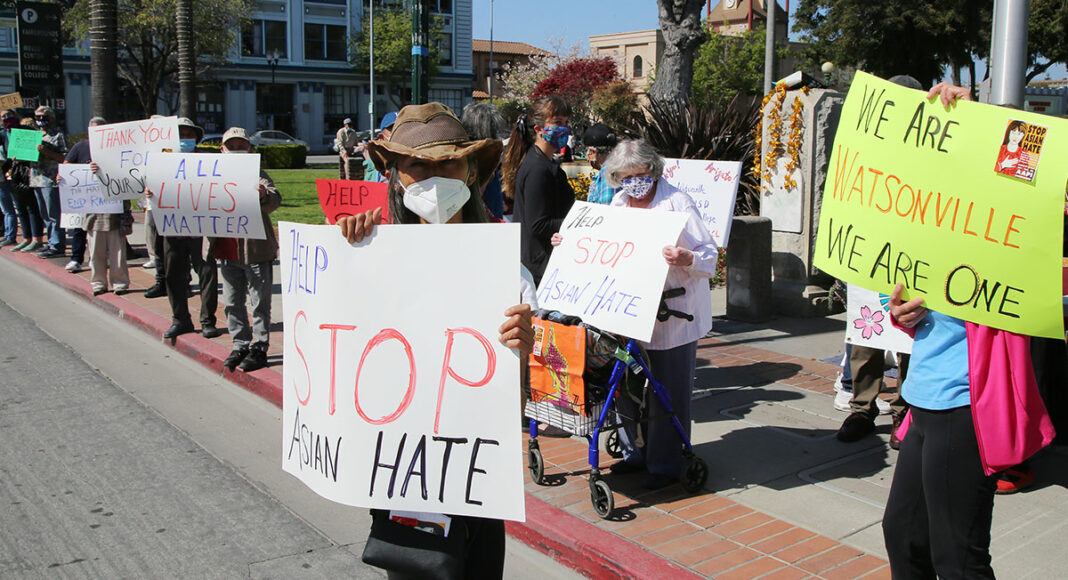Victor Kimura was just 6 months old when his family moved back to Freedom after being imprisoned in Arizona’s Poston Camp during World War II.
His mother and father, born in Watsonville and Petaluma, respectively, told him very little about the days prior to the family’s return to California’s Central Coast in 1945. Kimura says they did not need to say much for him to understand that “something was very, very wrong.”
“I would be at home talking to my parents in the front living room and somebody would throw a rock with a paper wrapped around saying ‘Japs go home’ through our front window,” he said while holding a Watsonville-Santa Cruz Japanese American Citizens League banner during a recent rally in support of the Asian American Pacific Islander (AAPI) community in downtown Watsonville.
He added: “I was ready for anything.”
Kimura was one of roughly 100 people who showed up to Watsonville’s City Plaza on April 17 for the city’s second rally in support of the AAPI community. Dozens of Japanese-Americans who call Santa Cruz County home were in attendance with signs reading “Stop Asian Hate.”
The same group that organized that gathering helped organize a vigil at the Santa Cruz County Offices in late March that honored the victims of the recent mass shooting in Georgia. That collective, called Asian Americans Pacific Islanders of Santa Cruz County, came together in response to the recent uptick in attacks against the AAPI community, says Lucien Kubo, a Santa Cruz artist and activist.
Kubo helped put together the vigil in Santa Cruz, and brought it over to Watsonville for the April rally. She added two new names to the most-recent vigil: Daunte Wright and Adam Toledo. Wright, a 20-year-old Black man, and Toledo, a 13-year-old Latinx male, were recently fatally shot by police in incidents that have gained national attention. Kubo, who is Japanese-American, said it was important to show solidarity with other minority communities because in the past the AAPI community, and its quiet, “nose-to-the-grindstone” characterization, has been used as a tool to divide minorities.
“People say other minorities should be quiet and hard-working like the Japanese. It’s a divide-and-conquer type of thing,” she says. “It divides us, instead of showing that we really have a lot in common …. This is kind of special that Asians are speaking up, and organizing like this.”
According to a national report from Stop AAPI Hate, a California-based organization that tracks hate incidents against that community, there were nearly 3,800 reported accounts of discrimination, violence or verbal harassment across the country from March 19, 2020 through Feb. 28, 2021 against the AAPI community.
That report was released on March 16, the same day as the shootings in Georgia in which eight people, including six Asian-American women, were killed by a white man while working at three separate massage spas.
Kimura says that hate toward the AAPI community has always been present in the U.S. below the surface, but recent political leaders, including former President Donald Trump, who pushed the terms “China Virus” and “Kung Flu,” have pushed those beliefs into the mainstream and made them socially acceptable. Kimura says he once believed the displays of racism against the AAPI community would end before he died. Now, he says he’s not sure if the country will ever regain the foothold it once had before the pandemic was weaponized against the AAPI community.
He believes that his two sons, who are Japanese-American and Latinx, will at one point in their lives have to fight similar bouts with racism that he did.
“I don’t want them to deal with the same s*** I’ve had to deal with my whole life,” he said. “You always want things to be better for your kids.”
The city of Watsonville on April 13 showed solidarity by passing a resolution denouncing hate crimes and bigotry against the AAPI community.
Along with the resolution, city leaders have tried to make amends with the AAPI community. Late last year then-Mayor Rebecca J. Garcia put forth a resolution to officially apologize for the 1930 Watsonville Riots in which hundreds of armed white men over five days took to the streets, targeting and beating Filipino-American workers who they claimed were stealing their jobs and women, according to multiple reports.
Mayor Jimmy Dutra, who assumed the role in December 2020, highlighted Watsonville’s Sister City ties to Kawakami-Mura in Japan and Pinghu, Zhejiang Province in China as a way the city has uplifted its AAPI community, and said that he plans to honor longtime Watsonville businesses next month for AAPI Heritage Month.
“Your actions say a lot,” said Dutra, who attended the rally. “When you’re standing up and you’re saying things that are positive about a community, it rubs off. We’ve seen what happens when someone from the top says something negative. That also rubs off.”













